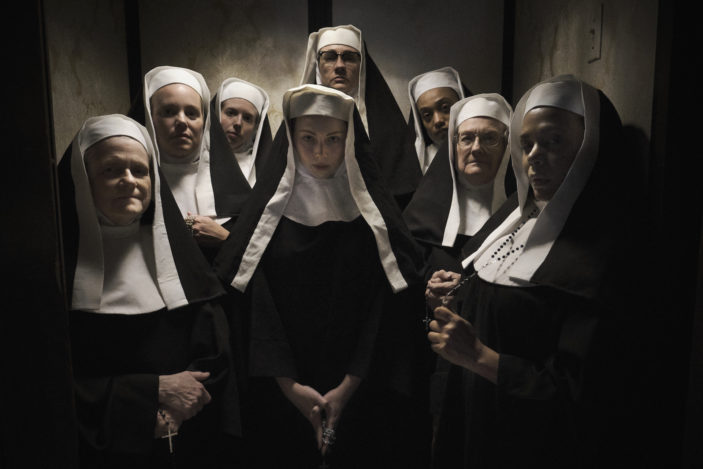
Starting on a blackly comic note and ending on a vastly different one of dramatic grit, Mickey Reece‘s Agnes is a truly confounding piece. Inserting a narrative and tonal shift half-way through its proceedings, Reece has created a unique film without question, but it’s one that is likely to irk viewers who could respond so positively to the over-the-top, slightly camp horror-leaning tale he initially creates, that its more serious ending may undo its entirety.
In a rather traditional horror set-up that brings to mind titles such as The Exorcist, a seasoned priest (Ben Hall‘s Father Donaghue) and his faithful novice (Jake Horowitz‘s Benjamin) are brought to the Santa Theresa convent to investigate the bizarre behaviour of the titular Agnes (Hayley McFarland), a Sister who is potentially demonically possessed; the very opening of the film gives her an erratic outburst that leans into the exaggerated comedic mentality Reece appears to be going for, with unnatural dialogue and a campiness to the performances that, once accepted, are an awful lot of fun to behold.
Agnes herself is only sporadically seen throughout the film, and when she’s not sprouting off lines of profane filth to the Holy that are trying to appease her of her suffering, she’s remarkably tender, indicating that there is indeed something wrong with her, whether it be spiritual or mental is never truly revealed though. The Sister that sees this gentler side is the kindly Mary (Molly C. Quinn), a quiet type who seems to be evaluating her surroundings at all times, who the film then lays its focus on in a second act shift that doesn’t feel remotely earned or organic.
Though there is a connection of sorts between the film’s two halves – Mary having fled the convent that housed the unusualness of Agnes – it ultimately feels like its own product, with only passing mentions and the most minute of characters linking over. Reece does away with any comic temperaments and aims for strict drama, presenting Mary in a life post-convent where she’s trying to make it on her own, working minimum wage and deflecting uncomfortable advances from her lecherous boss (Chris Sullivan).
The introduction of a stand-up comedian (Sean Gunn) and Mary’s odd obsession with him makes way for a brief descent back into the possessive horror mindset of Agnes‘ earlier moments, but the lack of any concrete resolution to any of the characters means any investment we wish to have is void, resulting in an oddly empty film. And considering it touches on such issues as people’s belief systems and assault boundaries in the workplace, it’s even more of a shame that neither half committed to completing its narrative thematics.
Had each half been committed to as a full length feature I think Reece would have had a duo of winners on his hand – I personally would love to see the first section extended for the knowingly camp performances alone – but as Agnes stands in its format here, it’s far too uneven and unresolved. There’s promise throughout but these two halves have unfortunately not made a whole worthy of complete forgiveness.
![]()
![]()
![]()
![]()
![]()
TWO AND A HALF STARS (OUT OF FIVE)
Agnes is screening as part of this year’s Tribeca Film Festival, which is being presented both virtually and physically between June 9th – 20th, 2021. For more information head to the official Tribeca page.
